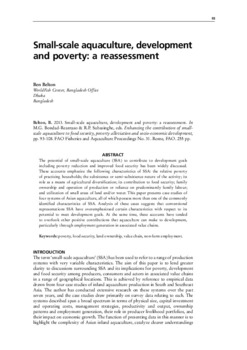Small-scale aquaculture, development and poverty: a reassessment

Citation
Belton, B. (2013). Small-scale aquaculture, development and poverty: a reassessment. p. 93-108. In: Bondad-Reantaso, M.G. ; Subasinghe, R.P.(eds.) Enhancing the contribution of smallscale aquaculture to food security, poverty alleviation and socio-economic development, FAO Fisheries and Aquaculture Proceedings No. 31. Rome, FAO. 255 pp.
The potential of small-scale aquaculture (SSA) to contribute to development goals including poverty reduction and improved food security has been widely discussed. These accounts emphasize the following characteristics of SSA: the relative poverty of practising households; the subsistence or semi-subsistence nature of the activity; its role as a means of agricultural diversification; its contribution to food security; family ownership and operation of production or reliance on predominantly family labour; and utilization of small areas of land and/or water. This paper presents case studies of four systems of Asian aquaculture, all of which possess more than one of the commonly identified characteristics of SSA. Analysis of these cases suggests that conventional representations SSA have overemphasizsed certain characteristics with respect to its potential to meet development goals. At the same time, these accounts have tended to overlook other positive contributions that aquaculture can make to development, particularly through employment generation in associated value chains.
Permalink
Date Available
Type
Publisher
Research Themes
Topics
Language